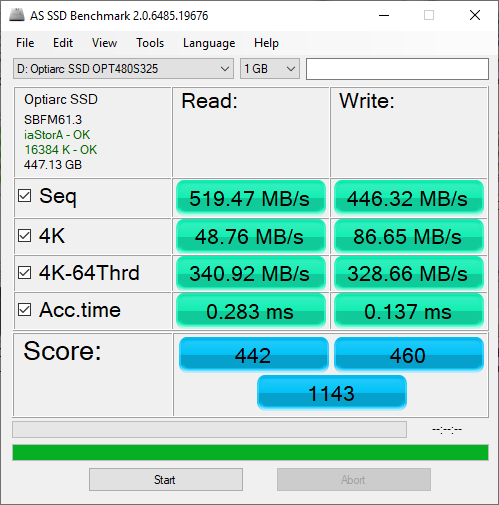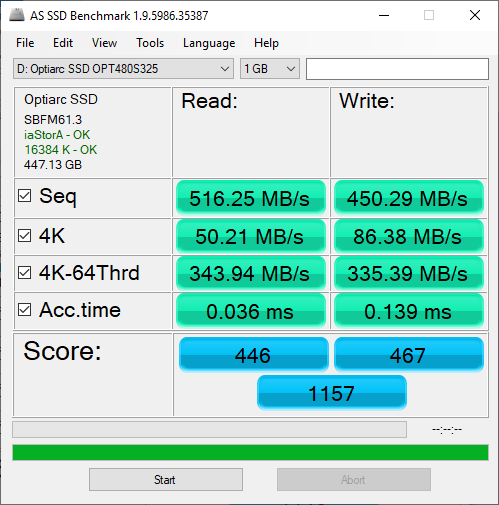TRIM Performance:
While SSD's offer many benefits, there are some downsides to using flash memory. One of the biggest issues people run into is performance degradation. Over time, an SSD will run out of fresh blocks and will have to write over data the file system has marked as deleted. This procedure is very complicated and can slow an SSD's write speeds considerably.
To fix this problem, most manufacturers have added TRIM support to their SSDs. The TRIM command allows an operating system, such as Windows 10, to tell an SSD which data blocks are no longer in use. Using this information, the drive pro-actively erases these blocks and adds them to the free block pool.

To test the VP's TRIM and garbage collection functions, I first put the drive in a "dirty" state. I used Iometer to fill 80% of the drive and then ran a random write test for 30 minutes. Looking at the screenshot below, you can see that the VP's average read and write speeds dropped to 475.79 MB/s and 69.54 MB/s, respectively.

Optiarc VP - Dirty
To see how well the VP could recover, I let the computer sit for about 30 minutes and then reran the test. The drive wasn't able to reach the factory fresh performance shown in our earlier tests. However, its average write speed jumped up to 446.32 MB/s.

Optiarc VP - After TRIM
Lastly, I used Parted Magic to perform a secure erase on the VP. With the drive wiped clean, it was able to read at 516.25 MB/s and write at 450.29 MB/s.

Optiarc VP - Secure Erased
Final Thoughts:
When shopping for an SSD, people typically look at things like performance and price. What many don't realize though is that reliability is just as important, especially when you're trusting it to store your personal data. Optiarc knows this and, with their new VP series SSD, they've delivered a drive that focuses first, and foremost, on data integrity and long term reliability. Along with an enhanced firmware, the VP is equipped with high caliber components like Phison's PS3111-S11 controller and Toshiba's 64-layer BiCS3 3D TLC NAND. Furthermore, the company puts their drives through a rigorous testing process to further reduce the chance of failure and data loss.
When it came time to perform, Optiarc's VP series SSD did fairly well throughout most of our tests. In our sequential read and write tests, the 480GB version of the drive was able to read at speeds as high as 562 MB/s and write at speeds in excess of 481 MB/s. Despite the lack of a separate DRAM cache, the VP also had no problems holding its own when doing random writes, producing more than 50,000 IOPS at low queue depths.
Optiarc's VP series SSD is available now in 240GB and 480GB capacities and can be purchased directly from RunTechMedia or through Amazon.com for $35 and $55, respectively. If you need more storage, the company has plans to release 960GB and 1920GB versions of the drive by the end of the year.
Highs:
- Available in 240GB and 480GB capacities
- Phison PS3111-S11 controller
- Equipped with Toshiba 64-layer BiCS3 3D TLC NAND
- Good sequential and random read and write performance
- Tested to ensure long term reliability and stability
- Ultra-slim form factor
- Reasonably priced
- 3 year warranty
Lows:
- Not as fast when writing incompressible data
- Does not support hardware based encryption
- Not available in higher capacities (yet)

